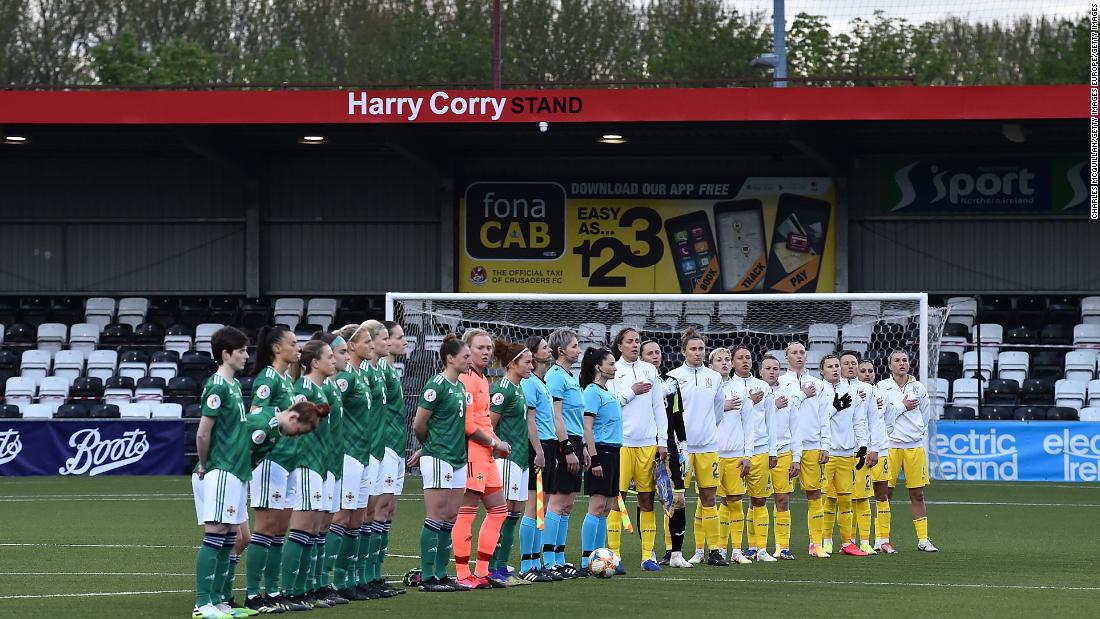
Each side belts out their anthem, accompanied by its fans in the crowd; shoulders are back, heads are held high, sometimes eyes fill with salty tears at the sound of the patriotic rallying call.
The other two countries which make up the UK have their own national anthems for sporting events that aren’t played out under the flag of Great Britain and Northern Ireland.
Wales has “Hen Wlad Fy Nhadau” (“Land of My Fathers”) and Scotland has “The Flower of Scotland.” But, in this instance, England and Northern Ireland will share “God Save the Queen.”
Different anthems for different sports
The Good Friday Agreement (or Belfast Agreement) helped bring an end to decades of conflict between nationalists seeking a united Ireland and loyalists wishing to remain a part of the UK.
These differing political views broadly aligned with religious beliefs, with Protestants favoring unionism and Catholics nationalism.
Northern Ireland has several national anthems in use across different sports, as well as different configurations of its teams — a relic of how each sport navigated this divide.
Each of these songs occupies a slightly different position in Northern Ireland’s political landscape.
In rugby, where the team plays as a united Ireland, the Republic of Ireland’s national anthem “Amhrán na bhFiann” (“The Soldier’s Song”) plays at home matches, alongside the specifically commissioned, more inclusive “Ireland’s Call,” which plays at both home and away matches.
“As a Catholic player, unfortunately, I don’t get that experience of standing tall and singing the anthem as loud as you can.
“But it doesn’t take away the pride and the passion and what it means to put on the green shirt. It will take someone to think outside the box, won’t it? And be brave enough to move it forward.”
‘What would happen to international sport in Ireland?’
Historically, each major sport has found a slightly different place within the Northern Irish landscape.
“The creation of the modern sporting world happened in the 19th century … And when that was happening, Ireland was not partitioned,” says Rouse.
When Northern Ireland was officially created on May 3, 1921, following the Irish War of Independence, teams in athletics, rugby and football represented the entire island.
“The question immediately rose up what would happen to international sport in Ireland,” Rouse says. “And it varies from sport to sport.”
The Irish Football Association (IFA) was, and still is, based in Belfast — the game’s historic heartland where it first entered Ireland.
Unlike rugby, whose governing body was based in Dublin and structures allowed for more regional autonomy, football split into two with the establishment of the Football Association of Ireland (FAI) in Dublin in 1921.
The IFA and the FAI initially both fielded international teams called Ireland, selecting players from north and south of the border, until the 1950s when the demands of World Cup qualifying competitions forced the teams to become entirely separate.
But the success of the Northern Ireland squad at the 1982 and 1986 World Cups, featuring players from both communities, showed how football could, at times, transcend the political divisions.
“We tend to focus on the divide, it wasn’t just a divide, it was also a game which bound them together,” says Rouse.
These efforts to unite football have intensified following the peace process.
In 2006, the Amalgamation of Northern Ireland Supporters’ Clubs was awarded the Brussels International Supporters’ Award for supporting charities and its efforts to tackle sectarianism.
Euro 2022
The Northern Ireland Women’s Football Association (NIWFA) is a much newer entity, formed in 1976, and since then, women’s football in the country has grown exponentially.
Its increasing popularity aligns with the trends in women’s football across Europe. Euro 2022 has already set attendance records — around 450,000 tickets were sold before the tournament — while more than 91,000 fans twice piled into the Camp Nou to watch Barcelona Femení earlier this year.
An official song — “Girl Got Game” by Jessica Hammond — has also been released to support the team and highlight women’s football.
Tapping into this, the Northern Ireland women’s team are hoping to emulate the ‘spirit of 2016’ that permeated the country when the men’s team qualified for Euro 2016.
It is the first time that the Northern Ireland women’s team has qualified for a major tournament, despite several long-term injuries to its key players.
No matter what the result of Friday’s match, Northern Ireland will not reach the knockout stages following losses to Norway and Austria in its opening two matches, but the journey has the players feeling optimistic about the future.
